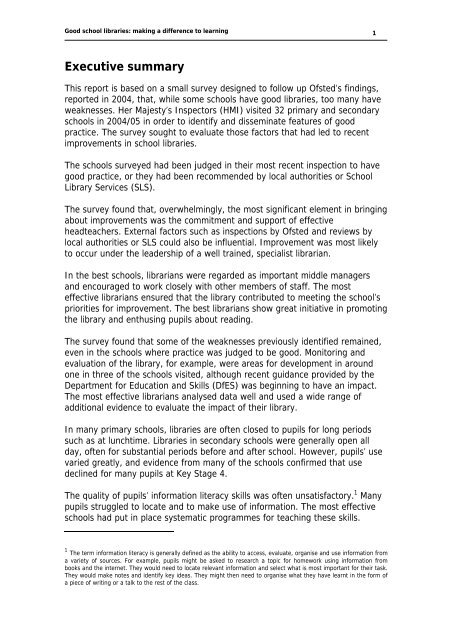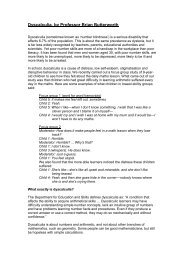Good school libraries: - Digital Education Resource Archive (DERA)
Good school libraries: - Digital Education Resource Archive (DERA)
Good school libraries: - Digital Education Resource Archive (DERA)
You also want an ePaper? Increase the reach of your titles
YUMPU automatically turns print PDFs into web optimized ePapers that Google loves.
<strong>Good</strong> <strong>school</strong> <strong>libraries</strong>: making a difference to learning 1<br />
Executive summary<br />
This report is based on a small survey designed to follow up Ofsted’s findings,<br />
reported in 2004, that, while some <strong>school</strong>s have good <strong>libraries</strong>, too many have<br />
weaknesses. Her Majesty’s Inspectors (HMI) visited 32 primary and secondary<br />
<strong>school</strong>s in 2004/05 in order to identify and disseminate features of good<br />
practice. The survey sought to evaluate those factors that had led to recent<br />
improvements in <strong>school</strong> <strong>libraries</strong>.<br />
The <strong>school</strong>s surveyed had been judged in their most recent inspection to have<br />
good practice, or they had been recommended by local authorities or School<br />
Library Services (SLS).<br />
The survey found that, overwhelmingly, the most significant element in bringing<br />
about improvements was the commitment and support of effective<br />
headteachers. External factors such as inspections by Ofsted and reviews by<br />
local authorities or SLS could also be influential. Improvement was most likely<br />
to occur under the leadership of a well trained, specialist librarian.<br />
In the best <strong>school</strong>s, librarians were regarded as important middle managers<br />
and encouraged to work closely with other members of staff. The most<br />
effective librarians ensured that the library contributed to meeting the <strong>school</strong>’s<br />
priorities for improvement. The best librarians show great initiative in promoting<br />
the library and enthusing pupils about reading.<br />
The survey found that some of the weaknesses previously identified remained,<br />
even in the <strong>school</strong>s where practice was judged to be good. Monitoring and<br />
evaluation of the library, for example, were areas for development in around<br />
one in three of the <strong>school</strong>s visited, although recent guidance provided by the<br />
Department for <strong>Education</strong> and Skills (DfES) was beginning to have an impact.<br />
The most effective librarians analysed data well and used a wide range of<br />
additional evidence to evaluate the impact of their library.<br />
In many primary <strong>school</strong>s, <strong>libraries</strong> are often closed to pupils for long periods<br />
such as at lunchtime. Libraries in secondary <strong>school</strong>s were generally open all<br />
day, often for substantial periods before and after <strong>school</strong>. However, pupils’ use<br />
varied greatly, and evidence from many of the <strong>school</strong>s confirmed that use<br />
declined for many pupils at Key Stage 4.<br />
The quality of pupils’ information literacy skills was often unsatisfactory. 1 Many<br />
pupils struggled to locate and to make use of information. The most effective<br />
<strong>school</strong>s had put in place systematic programmes for teaching these skills.<br />
1 The term information literacy is generally defined as the ability to access, evaluate, organise and use information from<br />
a variety of sources. For example, pupils might be asked to research a topic for homework using information from<br />
books and the internet. They would need to locate relevant information and select what is most important for their task.<br />
They would make notes and identify key ideas. They might then need to organise what they have learnt in the form of<br />
a piece of writing or a talk to the rest of the class.



